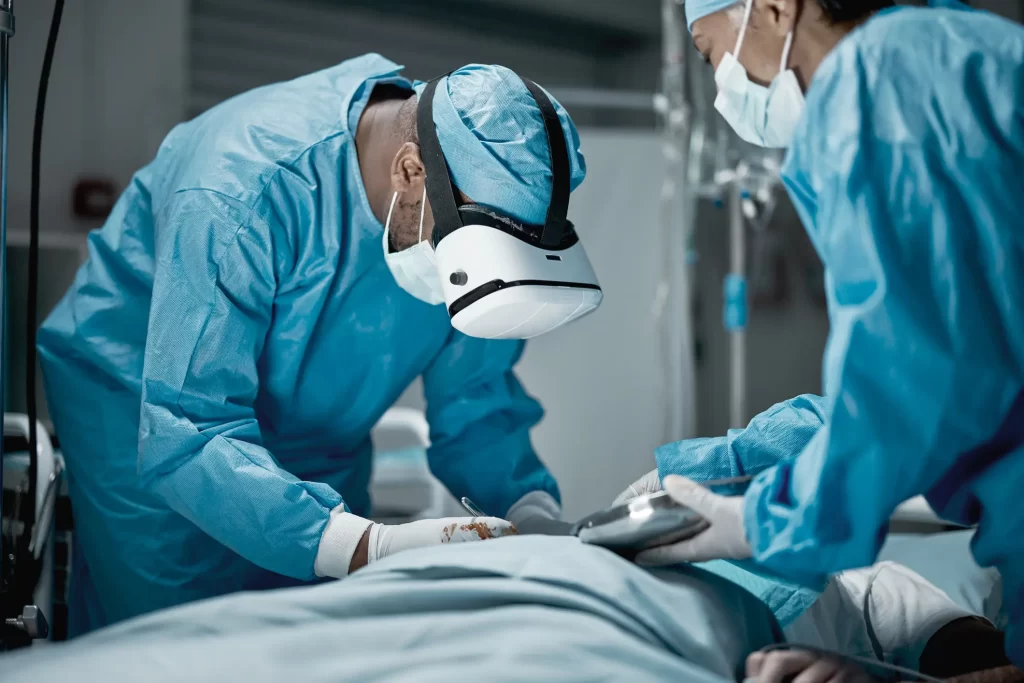Virtual Reality (VR) technology has emerged as a transformative tool in surgical education, offering immersive and interactive environments where medical professionals can hone their skills without the inherent risks of real-life procedures. As a medical professional, understanding the applications, benefits, and challenges of VR in surgical training can enhance your approach to skill development and patient care.
VR has been successfully integrated into various surgical specialties, providing realistic simulations that replicate the complexities of actual surgeries. This immersive approach allows you to practice and refine techniques in a controlled setting, bridging the gap between theoretical knowledge and practical application.
Laparoscopic Surgical Training
In laparoscopic surgery, VR simulations offer a platform to practice minimally invasive procedures. By engaging with these simulations, you can improve your technical skills and build confidence before performing on patients. Studies have shown that such VR training leads to enhanced proficiency and reduced error rates among surgical residents.
Orthopedic Surgery
For orthopedic surgeons, VR training programs provide realistic scenarios that mimic complex surgical procedures. Participating in these programs can enhance your decision-making skills and situational awareness, leading to better patient outcomes. Institutions that have implemented VR training have reported significant improvements in their surgeons’ performance.
General Surgical Skills
VR simulations are also utilized to develop general surgical skills. By practicing in a virtual environment, you can increase your proficiency in various surgical techniques and reduce the likelihood of errors during actual procedures. This method of training has been associated with higher success rates in real-life surgeries.
Benefits of VR Simulation in Surgical Training
The adoption of VR in surgical training offers several advantages that can directly impact your professional development and patient care.
Risk-Free Learning Environment
VR provides a safe space where you can practice complex procedures without any risk to patients. This environment allows for repeated practice, enabling you to learn from mistakes and refine your techniques. The ability to make errors and receive immediate feedback in a virtual setting is invaluable for skill acquisition.
Enhanced Skill Acquisition
Engaging with VR simulations has been shown to improve technical skills, hand-eye coordination, and spatial awareness. These enhancements are crucial for performing intricate surgical procedures with precision. Research indicates that surgeons who undergo VR training exhibit improved performance outcomes compared to those who rely solely on traditional methods.
Immediate Feedback and Assessment
VR training programs often include features that provide instant feedback on your performance. This immediate assessment allows you to identify areas for improvement and track your progress over time. Such feedback is essential for continuous learning and skill refinement.
Limitations and Challenges of VR Simulation
While VR offers numerous benefits, it’s important to be aware of the limitations and challenges associated with its use in surgical training.
High Costs
The development and maintenance of VR systems can be costly, potentially limiting access for some medical institutions. These financial constraints may affect the availability of VR training programs, thereby impacting your opportunity to engage with this technology.
Technological Limitations
Despite advancements, some VR systems may lack the realism necessary to fully replicate surgical scenarios. This limitation can affect the transferability of skills from the virtual environment to real-life procedures. Additionally, not all surgical procedures are easily simulated in VR, which may restrict the scope of training available.
Learning Barriers
Adapting to VR technology may present a learning curve for some practitioners. Familiarizing yourself with the equipment and software is essential to fully benefit from VR training. Institutions must provide adequate support to ensure that all trainees can effectively engage with the technology.
Addressing the Challenges
To maximize the benefits of VR in surgical training, it’s important to consider strategies to overcome these challenges.
Investment in Resources
Advocating for investment in VR technology within your institution can help mitigate financial barriers. Highlighting the long-term benefits, such as improved surgical outcomes and reduced training times, can support the case for funding.
Continuous Technological Updates
Staying informed about advancements in VR technology ensures that you are utilizing the most effective tools available. Engaging in ongoing education and training can help you keep pace with technological developments and maintain proficiency.
Collaborative Learning
Participating in collaborative VR training sessions can enhance the learning experience. Working with peers in a virtual environment fosters teamwork and communication skills, which are essential in surgical practice.
Future Directions of VR in Surgical Training
The future of VR in surgical training is promising, with ongoing research and development aimed at enhancing its effectiveness.
Personalized Training Programs
The development of customized VR simulations tailored to individual learning needs is an emerging trend. These programs can adapt to your specific skill level and learning pace, providing a more personalized training experience.
Integration with Artificial Intelligence
Integrating artificial intelligence (AI) with VR can provide advanced analytics and feedback, further enhancing the training experience. AI can analyze your performance data to offer insights and recommendations for improvement.
Expansion into New Surgical Fields
As VR technology evolves, its application is expanding into new surgical specialties. Staying informed about these developments can open opportunities for training in a broader range of procedures.
In conclusion, embracing VR technology in your surgical training can significantly enhance your skills and confidence and will likely become the new standard for surgical skill development.



